Olympic Longevity: Meet 9 Tokyo 2020 Athletes Over 40 Who Are Proving that Age is No Barrier To Success

Brazilian soccer legend Formiga — seen here during a 2019 match — is, at age 43, the oldest soccer player to ever compete at the Olympics. Photo: Miguel Schincariol / Getty Images
The highlight of the Tokyo Summer Games so far came when Oksana Chusovitina, the 46-year-old gymnast from Uzbekistan, received a standing ovation from her fellow Olympians as she concluded her record-setting eighth, and final, Olympics appearance.
It was a heart-warming moment for Chusovitina, but it also served as a reminder that the Olympic Games are not solely the domain of teenage and 20-something competitors.
In fact, the Tokyo Games feature a number of dynamic, influential and record-setting Olympic athletes just like Chusovitina, whose stories stand as a victory for longevity and proof that age is no barrier to achieving any goal. So from a 66-year-old Australian equestrian to a 43-year-old Brazilian women’s soccer pioneer, meet nine more top-level Tokyo Olympians over the age of 40.
Mary Hanna, 66
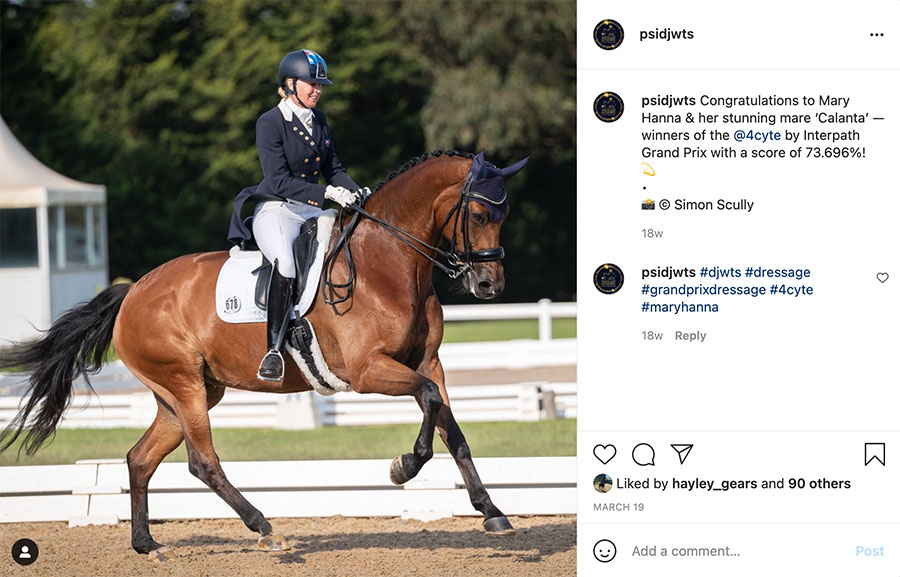
The 66-year-old equestrian is, at once, the oldest competitor in any sport at the Tokyo Olympics, the second-oldest female competitor to ever compete in the Olympics and Australia’s oldest ever Olympic athlete.
Of course, Hanna doesn’t pay much attention to any of that. She told Horse & Hound recently that, “I don’t think about my age because there’s a lot of older people riding and doing really well. Nobody in horse sport ever mentions my age, it’s only when I get out of horse sport that people mention it and think it’s a bit odd. But young or old, it doesn’t make a difference, if you’re fit and healthy, you can just keep going.”
For Hanna, equestrian sports are all in the family. According to her Olympic bio, she first took to the saddle at the tender age of four on her parents’ farm.
“Ours was a very horsey family, it was compulsory,” she told The Horse Magazine. “If you didn’t ride you didn’t get fed practically. I lived on a property in the Western District and everybody rode. We rode to do the stock work, it was just part of life.”
Her late first husband, Gert Donvig, was an elite dressage rider, while her current husband, Rob Hanna, was also an equestrian rider who served as the Australian national team’s chef d’équipe (manager). Meanwhile, Hanna’s daughter, Gitte Donvig, repped Australia in dressage World Cup competitions before suffering a head injury in a riding accident in 2019.
Hanna — who received induction into the Equestrian Victoria Hall of Fame in 2018 — also owns the Statene Park Dressage Centre in Australia with her husband.
The equestrian turns 67 on Dec. 1 and is appearing in her sixth Olympic Games (the first female Australian athlete to achieve the feat), having debuted in Atlanta in 1996. Competing in both Dressage Individual and Dressage Team events, her highest Olympic placement in the former was 24th place (1996) and, in the latter, sixth place (2000).
UPDATE: In Tokyo, Hanna placed 13th in the Dressage Team event on July 27 and 40th in the Dressage Individual event on July 28.
Andrew Hoy, 62
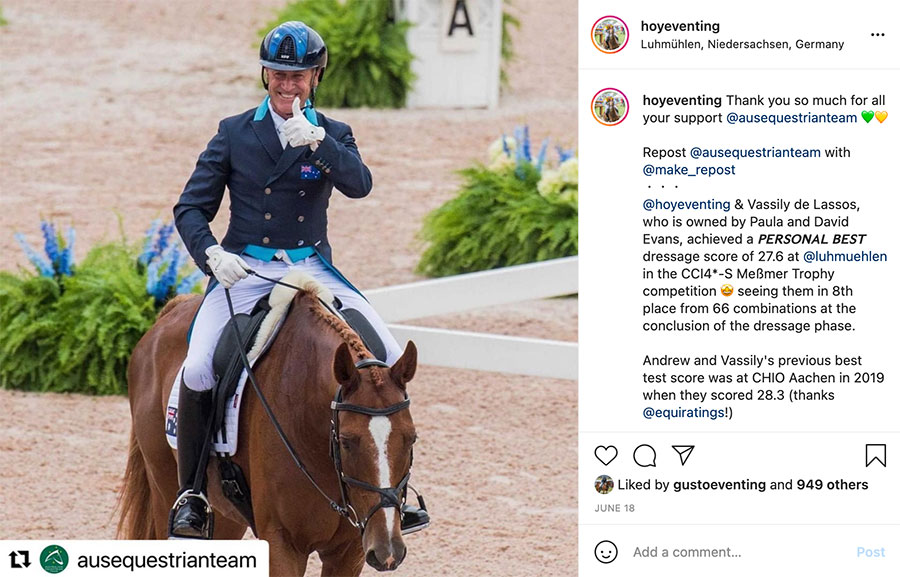
You could call Mary Hanna’s fellow Australian equestrian Andrew Hoy, 62, the Aussie Ironman. That’s because he’s competing in his eighth Olympics this year — a record for his nation.
That streak — which, remarkably, stretches back to the 1984 Los Angeles Olympics — includes three straight gold medals in Barcelona (1992), Atlanta (1996) and Sydney (2000) in the Team Eventing competition, as well as a silver medal in Sydney in the Individual Eventing competition.
Hoy, who’s received induction into the Sport Australia Hall of Fame (2001) and the Equestrian Australia Hall of Fame (2015), noted that, at this point in his career, he feels as prepared as ever to compete against the world’s best.
“I have the best horse power I believe that I’ve ever had, the best number of horses coming on that I’ve ever had in my career and that is something that is very special,” he said in an interview posted to his Olympic bio. “I might be getting older but I am enjoying eventing even more. I’m never thinking, ‘Well, I’m now at this age, I should start thinking of retiring.’ I’m always looking towards the next thing.”
UPDATE: Hoy competed in the Equestrian, Eventing Team competition on July 30 (placing 54th, while Australia placed 10th) and will compete in the Equestrian, Eventing Individual competition on Aug. 2.
Santiago Raul Lange, 59
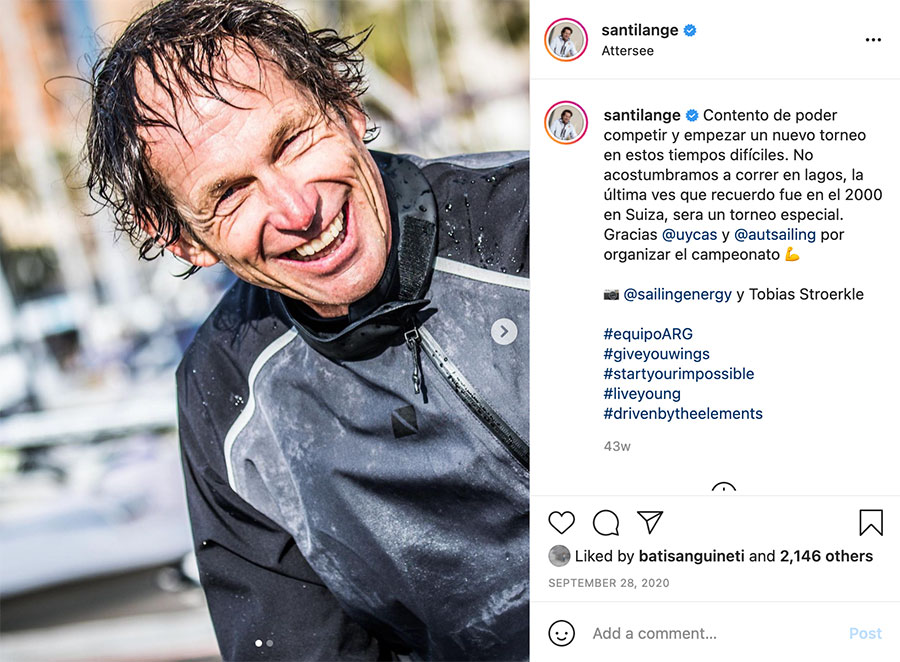
At the Rio de Janeiro Olympics in 2016, Santiago Raul Lange and his sailing partner Cecilia Carranza Saroli became the first Argentinian team to ever win a gold medal for sailing. Not bad considering, just one year prior, a cancer diagnosis led to doctors removing 80 percent of Lange’s left lung.
This year, the 59-year-old returns to Olympic competition for the seventh time, boasting two previous bronze medals (in Sailing – Tornado) in 2004 and 2008 alongside his gold.
In an interview posted on his Olympic bio, Lange likened his cancer battle to navigating a ship.
“I was in a storm in the middle of the sea and I couldn’t get off the ship. A reality that had to be lived,” he explained. “The operation, somehow, motivated me to go to Rio de Janeiro. I was fortunate that the 2016 Olympics were held within a year. My mind wasn’t caught by cancer or surgery, but I was looking forward to the competition.”
Lange originally retired after the 2016 Olympics but came back for 2020 (where he and Saroli served as the Argentinian flag bearers at the opening ceremonies) and hasn’t ruled out an appearance in the 2024 Games in Paris.
“I still enjoy the challenge of getting well prepared for the Olympic Games,” he said in another interview posted to his Olympic bio. “While my body and my mind are available, I’m enjoying the journey and will continue to do it.”
UPDATE: Lange competes in the Mixed Multihull – Nacra 17 Foiling competition, which holds races almost daily through to the medal race on Aug. 3.
Phillip Dutton, 57
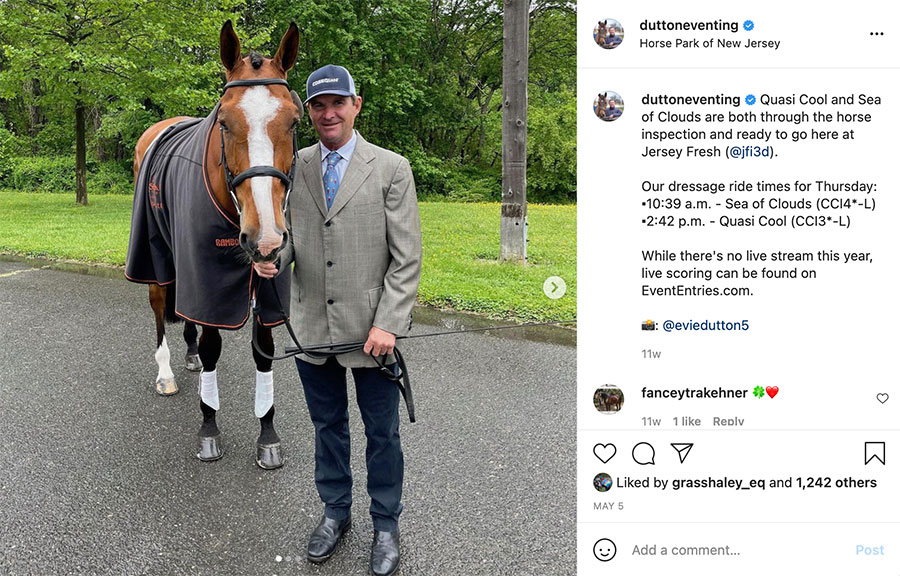
At age 57, Dutton is competing in his seventh Olympic Games under his second national banner.
The third Australian-born equestrian on our list, Dutton originally represented his birth nation in the Equestrian Eventing competition, nabbing gold medals in his first Olympics in Atlanta (1996) and again in Sydney (2000), both in the Eventing Team category (alongside Andrew Hoy). He moved to the United States in 1991, however, and, in 2006, announced that he’d gained his American citizenship and would compete on behalf of that country going forward.
As an American equestrian team member, he competed in Beijing (2008), London (2012), and Rio de Janeiro (2016), nabbing a bronze medal in the Eventing Individual competition at the latter.
A lover of horses since childhood, Dutton was inducted into the Australian Sports Hall of Fame in 2002. He also told Sidelines Magazine earlier this year that, when it comes to aging in sport, he looks to NFL quarterback Tom Brady — who became the oldest player to ever win a Super Bowl earlier this year — as inspiration.
“I was very inspired by Tom Brady in the Super Bowl, because he kind of proved that there’s no set age or number for when you can do your best. Certainly, I think along those lines and don’t think there’s a set number when you have to stop.”
He added that, “I’d like to go for as long as I can, but I also don’t want to be stupid about it. I don’t see a retirement date at this stage. As long as I’m not embarrassing me or the family, I think I can keep going for a while!”
In 2021, Dutton captains the American equestrian eventing team and, according to NBC Sports, is the oldest American athlete to compete at the Olympics in 13 years.
UPDATE: Dutton placed 12th in the Equestrian, Eventing Team competition on July 30 (the U.S. team placed ninth overall) and will compete in the Equestrian, Eventing Individual competition on Aug. 2.
Nino Salukvadze, 52

The 52-year-old Georgian Shooting competitor appears in her ninth Olympics this year — a record for any female athlete. But Salukvadze is no stranger to making history.
She won gold in the 25m Pistol Shooting event at the 1988 Seoul Games, competing on behalf of the Soviet Union. She won a silver medal that same year in the 10m Pistol event and, later, a bronze in the 10m in Beijing in 2008. The latter medal — won while competing on behalf of Georgia — made her the first person to win a shooting medal for the country. In 2016, her son, Tsotne Machavariani, also competed on behalf of Georgia in Shooting, making the pair the first mother-son duo to ever appear at the same Olympics together.
Last year, she told the Associated Press about the contrast between competing at the Olympics in the 1990s and 2000s while at home, the Soviet Union crumbled and her native Georgia warred with Russia.
“There was war. There was hunger. We lived without light or gas. In the 1990s, we lived through worse than this with the coronavirus. There was a lot of friendship and everyone united,” she explained.
But in an interview with Trans World Sport in 2017 (and reprinted on her Olympic bio), she noted that there’s no secret for her ongoing success.
“It is just a lot of hard work and dedication.”
UPDATE: Salukvadze placed 31st in the Tokyo Games 10m Air Pistol Women qualifying, which means she did not move on in that event. As well, she placed 25th in the Shooting – 25m Pistol Women Qualifying on July 29, which failed to qualify for the medal competition.
Rune “The Danish Destroyer” Gilfberg, 46
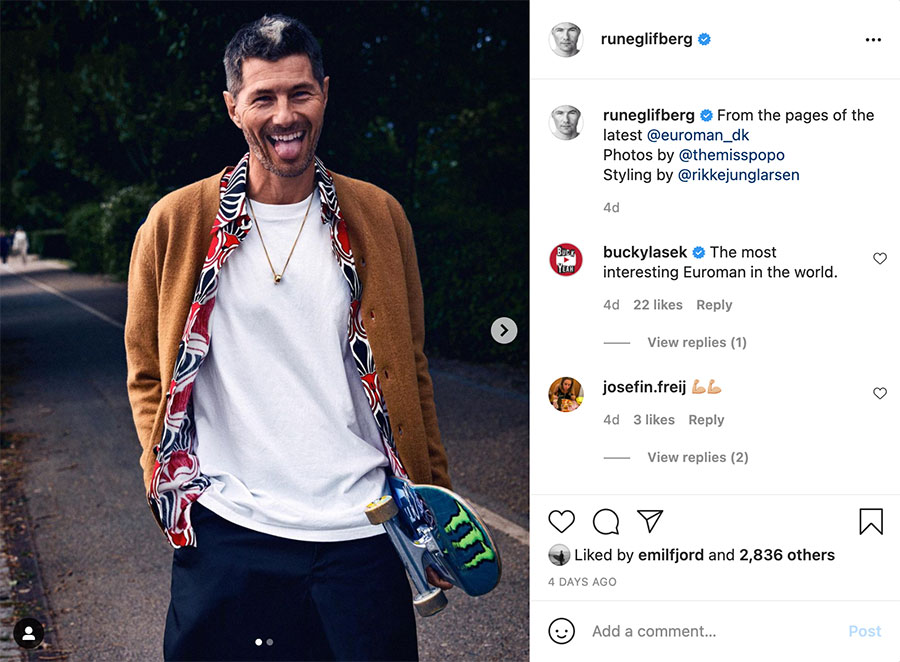
Dubbed “The Danish Destroyer,” Glifberg, at age 46, is the oldest athlete debuting at the Tokyo Summer Games. Even more impressive — he’s competing in the brand new Olympic sport of skateboarding, an event designed to attract younger viewers to the Games.
The 12-time X Games medalist (including two championships), however, is not only a skateboarder. In his native Denmark, he co-founded the architecture firm Glifberg-Lykke, which designs skateparks.
Glifberg, who turns 47 on Oct. 7 and has competed against skateboarding legend Tony Hawk, spoke with Wasted Attitude about how it feels to face off against athletes half his age in Tokyo.
“I definitely see a little bit of myself in them when I see their attitude towards competing and how everything’s new and interesting to them,” he explained. “But, from a competitive standpoint, I obviously have a lot more experience, and maybe I’ll be able to feel more at ease on the big scene with all the cameras and everything that’s going to be happening around the Olympics … I’m just happy to be skateboarding, and I feel blessed that I’m still able to perform at this level at my age.”
He added that “it’s definitely hard for me sometimes to find the motivation to go out and compete” at 46, but noted that he considered it a personal challenge to succeed in even qualifying for the Olympics against athletes so much younger than him.
“I also find a bit of motivation in trying to be a good ambassador for skateboarding in Denmark,” he continued. “I’m trying to lay a good foundation … For me, just to put Denmark into skateboarding in the Olympics, at the very first Olympics — hopefully, we’ll have guys in the future that will carry on that torch, and Denmark will be a part of the Olympics for years to come.”
The “Danish Destroyer” competes in the Skateboarding, Men’s Park Olympic event on Aug. 5.
Dallas Oberholzer, 46
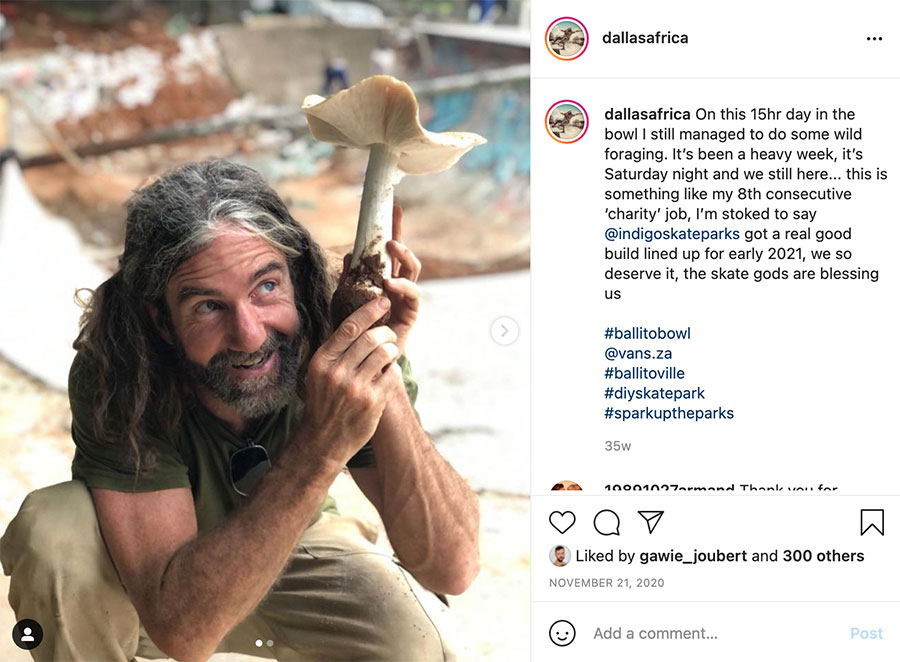
The 46-year-old South African skateboarding star is technically the second-oldest athlete making their Olympics debut in Tokyo — fellow skateboarder Rune Glifberg, who turns 47 in October, has him beat by a year — but that doesn’t make his journey any less special.
Oberholzer has been skating since 1985, according to his Olympic bio, and, beyond competing, he also founded the Indigo Youth Movement — an organization that mentors and helps at-risk kids through skateboarding in South Africa.
Oberholzer, who’s skated competitively in more than 50 countries throughout his career, may be older than all but one of all of his fellow Olympic competitors. Still, he espoused an attitude about skateboarding in an interview with Cape Talk 567 that could also prove the key to making the sport a perfect outlet for changing ideas around the limits of aging: “In our sport, there’s no putting us in a box and saying what works.”
Dallas Oberholzer competes in the Skateboarding, Men’s Park Olympic event on Aug. 5.
Jake Gibb, 45
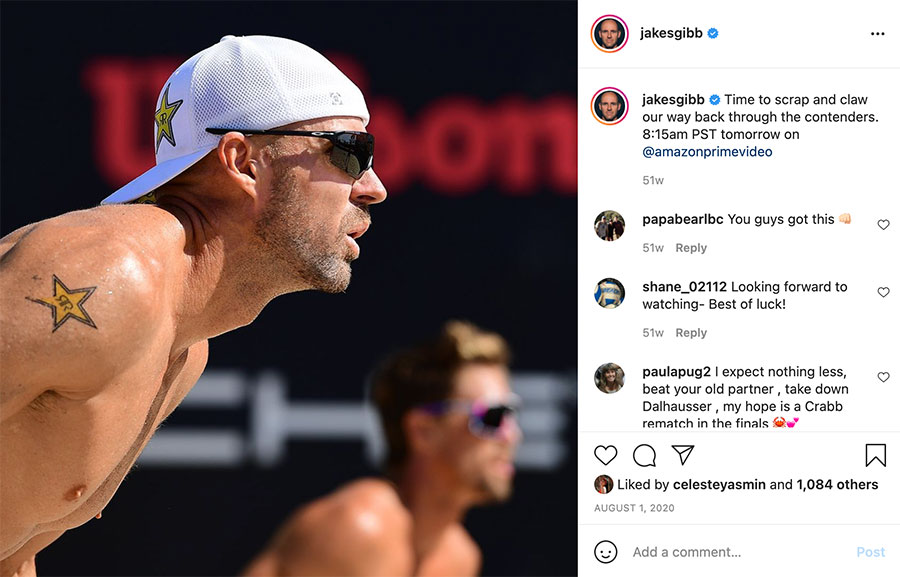
Jake Gibb’s road to Tokyo is fit for the big screen — and the 45-year-old beach volleyball player is hoping for a Hollywood ending.
Gibb, who set the record as the oldest Olympic competitor in beach volleyball ever this year, previously played at the Summer Olympics in Beijing (2008), London (2012) and Rio de Janeiro (2016). He placed fifth in his first two outings and 19th in his last.
But, as ESPN documented, his journey to the Games was anything but smooth. After a skin cancer diagnosis in 2003, he discovered he had testicular cancer in 2010 after failing a drug test. (He was clean, as the hormones elevated by the “drugs” were actually a sign of his cancer.) He beat cancer again in time to compete at the 2012 London Games. Then, as he prepared to go for what he dubbed his “last dance” in Tokyo, his partner, Taylor Crabb, tested positive for COVID-19. In an effort to offer Gibb his chance at an Olympic medal, Crabb gave his blessing for Gibb to compete with a new partner, 29-year-old Tri Bourne.
Gibb has acknowledged that if he’s ever to achieve his dream of winning an Olympic medal this is the year it has to happen, given that he plans to retire in 2021. And not only does he not consider his age a hindrance, he told CBS 8 that it actually gives him an advantage at the Olympics.
“So much of our game is pattern recognition,” he explained. “I’ve seen so many more unique plays and scenarios through my career and am able to react appropriately because of it. Don’t get me wrong — it takes a ton of work to keep up with the young bucks physically, but I’ve done that. I’ve done that work so now it’s [an] advantage.”
UPDATE: In the Beach Volleyball, Men’s Preliminary, Gibb and Bourne won their first match, over Italy and second over Switzerland. They lost their third match, to Qatar, on July 30. The quarterfinals begin on Aug. 4 with the medal matches taking place on Aug. 7.
Formiga, 43
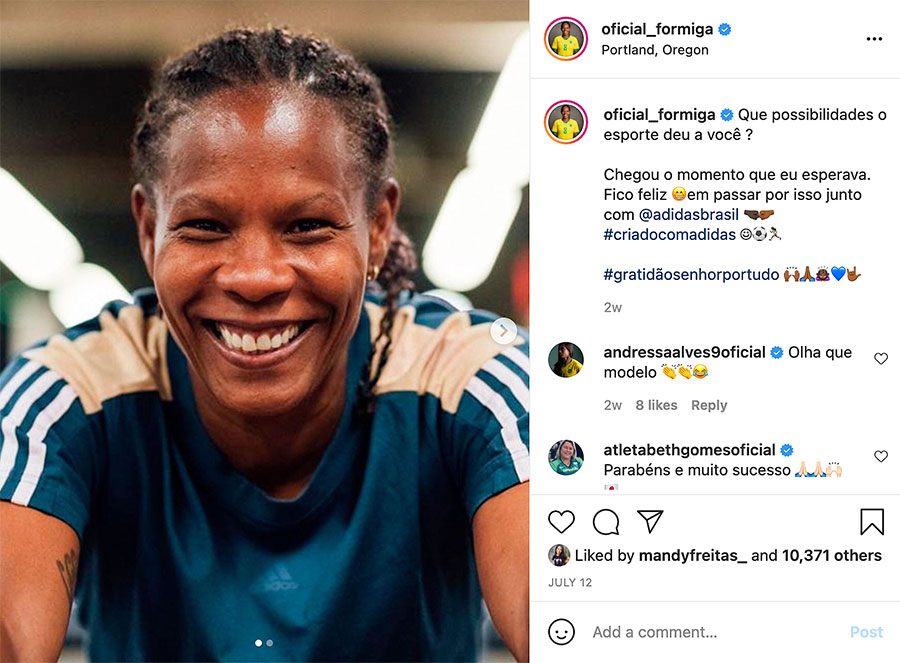
When talking about Olympic pioneers, Formiga’s name belongs at the top of the list.
At 43, the Brazilian midfielder is the oldest soccer player to ever compete at the Olympics. She’s also the only active player who has participated in every single women’s Olympic soccer tournament — dating back to the first in Atlanta in 1996. As such, her seventh Olympic appearance is both a record for any soccer player as well as any player in any team sport. She’s also played at the FIFA Women’s World Cup seven times — another record.
And, indeed, as Think Progress pointed out, “Formiga is [the] last active Brazilian player who was alive when women’s football was illegal in Brazil.” Formiga was born in 1978 and the sport only became legal for women to play in the country in 1981.
“She is a living, breathing symbol of how far women’s football has come in the last four decades, and how far it has left to go,” the publication added.
Formiga, in fact, is not her real name. It means “Ant” in Portuguese — a nickname she was given in her soccer-playing youth that, as the New York Times noted, referred to “how she plays: tenaciously and unselfishly, as part of a squad whose whole is greater than the sum of its parts.”
Her real name is Miraildes Maciel Mota and she began playing soccer at age seven. After a groundbreaking career that includes two Olympic silver medals (2004 and 2008), Formiga planned to hang up her cleats after the 2016 Games. But her coach asked her to stay and, as the New York Times reported, Formiga considered, “the two-steps-forward-one-step-back state of women’s soccer, and the precarious state of women’s rights, in general, back home in Brazil.”
“I was frustrated. I had fought so hard for recognition for women’s soccer, and I wanted conditions to get better for us women players, and it hadn’t happened,” she told the paper.
She added that, with the 2020 Games, the age gap between her and her teammates means that she plays a unique role within the team dynamic.
“I know they are living through a process that I have already lived through. Sometimes I need to stop and listen to them, and sometimes they have to listen to me. Respect within the group is essential,” she explained. “We are like a family. Sometimes I’m a friend, and sometimes I’m the mother.”
Either way, she’s a model of endurance and sports evolution at the 2020 Games.
UPDATE: Formiga and the Brazilian soccer team lost to Canada on penalty kicks in the Women’s Soccer Quarter-Final on July 30, eliminating Brazil from competition.
RELATED: